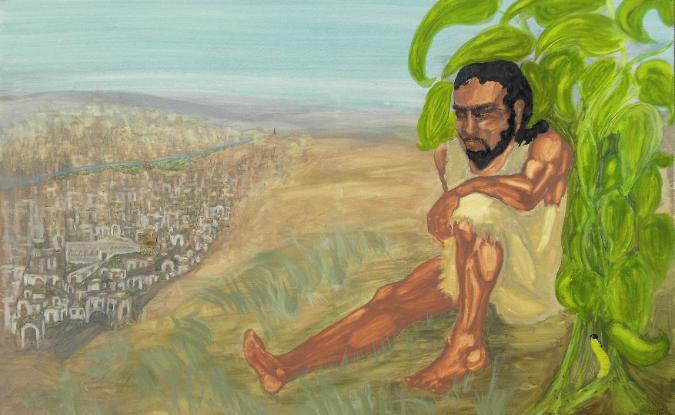“O that you would tear open the heavens and come down,
so that the mountains would quake at your presence—
as when fire kindles brushwood
and the fire causes water to boil—
to make your name known to your adversaries,
so that the nations might tremble at your presence!”
– Isaiah 64:1-2
God, my life is messed up!
God, the church is struggling!
God, the world seems to be coming apart in fear!
“Oh that you would tear open the heavens and come down!”
God you can fix this mess!
We know that you can fix this mess!
Why aren’t you coming to fix this mess?
Lament: (noun) a passionate expression of grief or sorrow…
The prophet Isaiah cries words of lament asking how long must we wait?
How long does Israel have to wait in exile?
My guess is if we were in Bethlehem today, surrounded by the walls Israel has built in the name of security – an answer to fear – I imagine Palestinian Christians might have an easy time picking up Isaiah’s cry: “How long? How long will these walls divide us?”
But we all have our own cries of lament.
How long do we have to wait for a loved one to be well?
How long do we have to wait for a relationship to show the signs of healing?
How long until a child turns to find the loving embrace of parent who welcomes them home?
How long do we need to wait to experience hope?
Sometimes I wonder if we’ve misplaced lament in the life of faith. I don’t think it’s because we’ve lost the ability to lament. We know that not everything is right in our world. We know that there are relationships with people close to us – even within our own families that are strained to the point of breaking.
So if we haven’t lost the ability to lament, do we fail to lean into lament because we’re not sure we permission to go there? It’s fairly common for worship gatherings to include some form of confession and the assurance of forgiveness. We are reminded on an almost weekly basis that we have things we need to repent of (The reminder to repent isn’t wrong or bad – especially if we can appreciate that repentance is about cleaning/clearing out the junk of our lives that keeps us from flourishing in Christ).
But when do we take up the plea of Isaiah? Or the cry of Job?
God, why is this happening?
God, why do we have to journey this way?
God, why is ISIS allowed to continue? Why is Donald Trump allowed a national stage to spread fear? Why is our western world so afraid?
When you have become exacerbated, exhausted, pushed to the limits of what you can handle…what do you do with the emotions rising up within you? What do you do with the deepest longings of your heart? Do you hold them in tight and hope no one will see the pain the holds you in?
What if you gave these to God? What if you opened your grip on that relationship/circumstance/experience – whatever it might be and released it to God? Not with a whimper or a cautious plea, but with the boldness of the prophet: How long do we have to wait God? Oh that you would tear open the heavens and come down!
In Mark 13:24-37, Jesus challenges his disciples to watch and pay careful attention to these signs – because these are the signs that will mark when the end is near, when the new day of God will arrive . But then in the next sentence Jesus reminds his disciples that not even he – not even the Son of God – knows the day or the hour when all these things will come to pass.
So the message is watch –
be ready,
be on the lookout,
stand guard,
be prepared…
But the message is also,
be patient,
rest in the assurance that God has this under control and you have nothing to worry about,
wait,
calmly wait…
Today we might be tempted to read a text like this and say, “Since the time of Jesus’ coming can’t be known, we don’t need to think much about it.” But Mark draws the opposite conclusion: since the timing is unknown, we should think about it all the time!
Or we might be tempted to think, “Since the time is unknown, it could be hundred, or thousands, or millions of years from now.” But again Mark draws a very different conclusion: since the timing is unknown, it could be today! Maybe this evening, or at midnight, or when dawn breaks.
Now a word of caution: these verses are not a guide to setting times and dates and order our calendars around the perceived events laid out here. This is not a text about calendars and dates.
This is a text about…
ALLEGIANCE…
LOVE…
HOPE!
Think about the one person you love more than anyone else in the world – the one your heart desires (Song of Solomon 3:4). Now imagine that loved one was away on a journey and had been away for much too long. So long that the familiar scent of their presence was gone and you were even having trouble remembering what they looked like without the help of a picture. Now imagine you received a note telling you that your loved one was coming home with the dawn.
For me that would be a sleepless night…
I would be waiting and hoping and longing to see the sun break over the horizon. I would be straining and pushing to catch the first glimpse of my loved one coming down the road,
or turning in the lane,
or walking through the door…
If you have experienced the depth of love you know what I’m talking about. And that depth of love might provide the best clue for exploring the end that Jesus shares with his disciples in Mark 13. Mostly because this isn’t the first time that Mark has painted a scene like this. In Mark 2, Jesus refers to himself as the long awaited bridegroom, asking how his followers could fast while the bridegroom is with them. But a time is coming when the bridegroom would be taken away and then – in the time of waiting – the followers would wait and watch and fast for his return.
Now don’t get me wrong – there is a lot we can celebrate in the world. But these days could also be described as a time for fasting as well as feasting, as a period of time when we will often be acutely aware of the absence of our Lord and Saviour.
The season of Advent invites us to wait.
But our waiting isn’t the quiet indifference of someone who has plenty of other things to do and waiting for the guest that arrives at Christmas is just another event on the calendar. Hardly!
We wait as lovers!
We wait with the impatience of someone who can hardly contain their emotion at being face to face with a loved one again. We wait impatiently for the full realization of our hope. For the full response to our lament. For the completion of our longing to know God as fully as we have been known. To see no longer through a dark pane, but face to face. To love as we have been loved. To experience Jesus Christ as he is, and in so doing, to become like him.
That’s HOPE for a new day!

 Daily we hear reports from our neighbours to the South that impact our nations budget decisions and cause fluctuations in the price of everyday goods.
Daily we hear reports from our neighbours to the South that impact our nations budget decisions and cause fluctuations in the price of everyday goods. “Wait a minute,” the buyer says. “You told me it always responds and obeys. Why did you hit it?”
“Wait a minute,” the buyer says. “You told me it always responds and obeys. Why did you hit it?” Jonah even has the gall to pray to God with the indignation of a stubborn child. As a parent, I can almost see Jonah’s pout as he whined to God “O LORD, is this not what I said when I was still at home? That is why I was so quick to flee to Tarshish. I knew that you are a gracious and compassionate God, slow to anger and abounding in love, a God who relents from sending calamity.”
Jonah even has the gall to pray to God with the indignation of a stubborn child. As a parent, I can almost see Jonah’s pout as he whined to God “O LORD, is this not what I said when I was still at home? That is why I was so quick to flee to Tarshish. I knew that you are a gracious and compassionate God, slow to anger and abounding in love, a God who relents from sending calamity.”